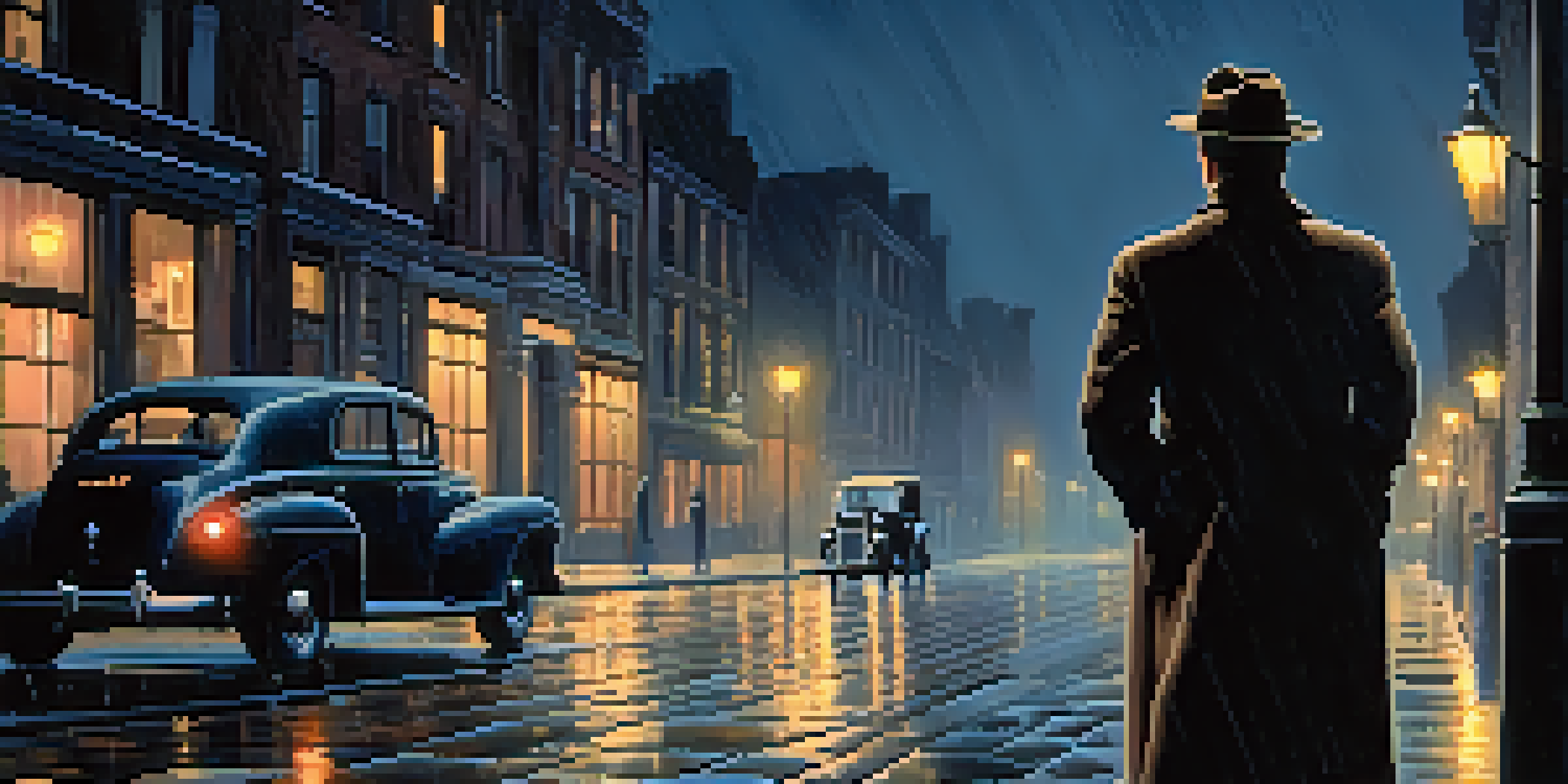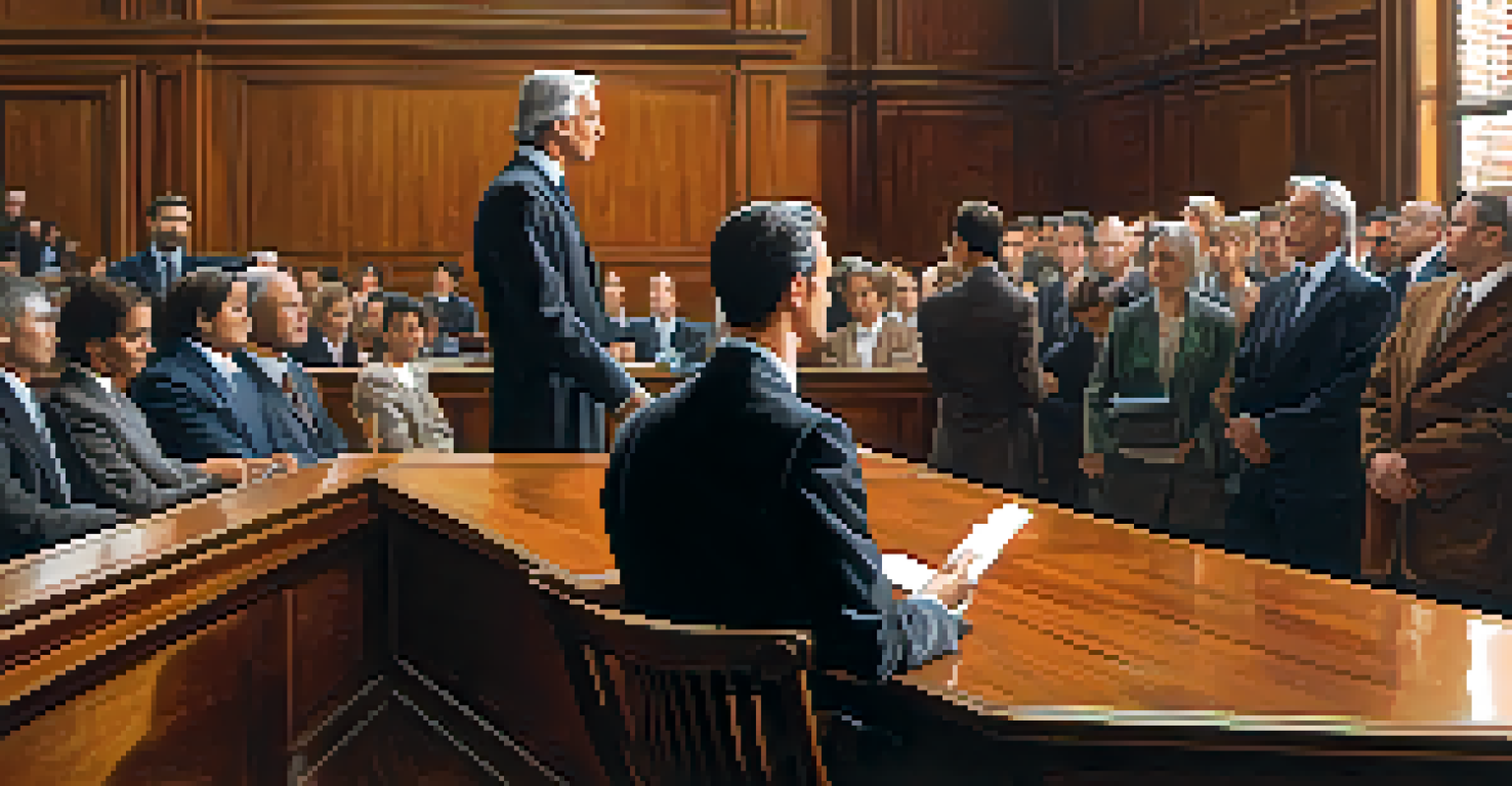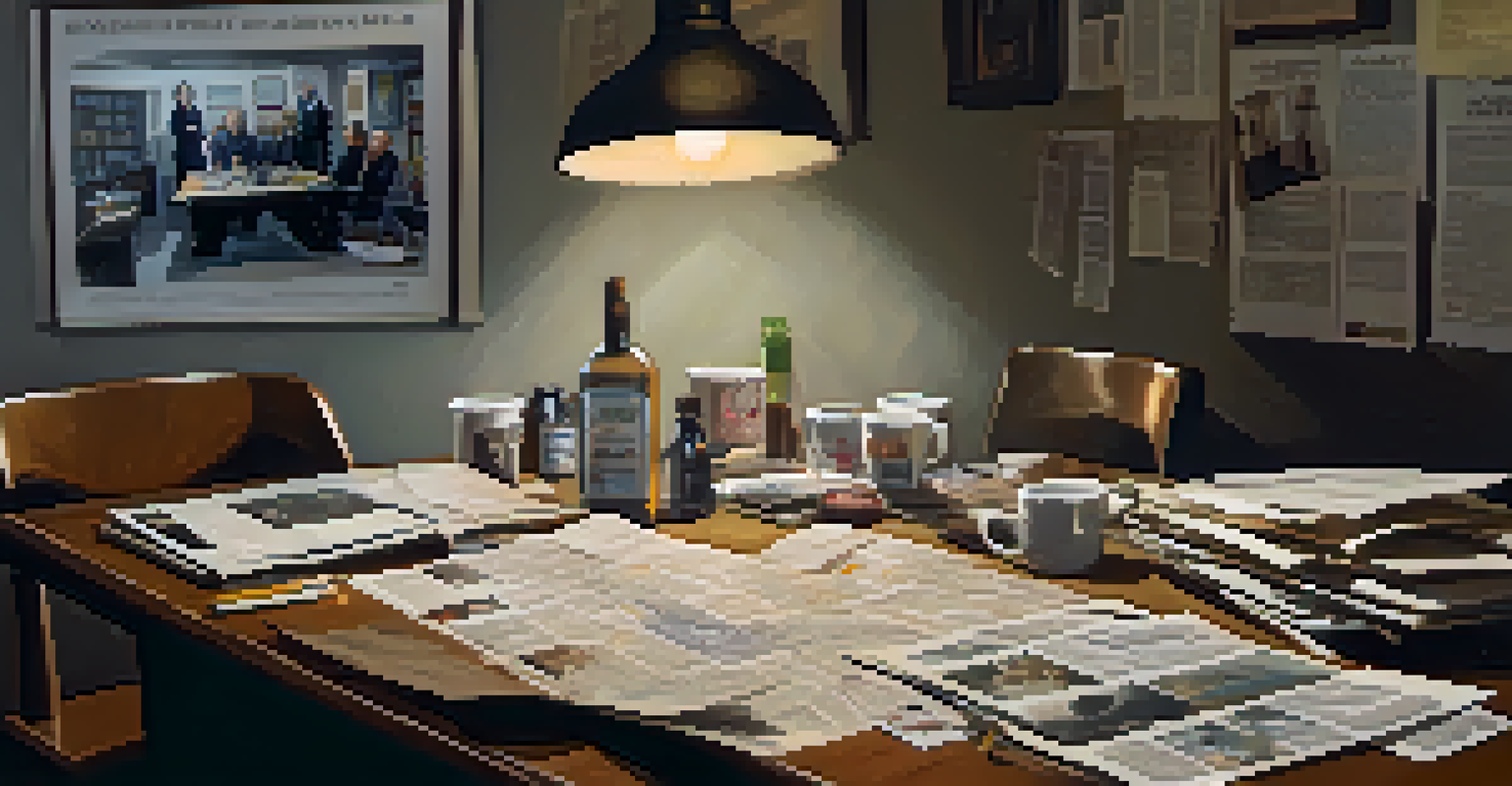How Hollywood Shapes Our Views on Crime and Justice Today

Hollywood's Longstanding Love Affair with Crime Stories
From classic noir films to modern thrillers, Hollywood has always had a fascination with crime stories. These narratives capture our attention, often depicting the darker sides of human behavior. The dramatic portrayals can evoke strong emotions, making us question morality and justice. It's this blend of intrigue and entertainment that keeps audiences coming back for more.
The media’s portrayal of crime can profoundly shape public perceptions and influence societal attitudes toward justice.
Movies like 'The Godfather' and 'Seven' not only entertain but also spark conversations about crime and its implications. They provide a lens through which we examine societal issues, often reflecting our own fears and anxieties about safety and justice. The romanticized view of criminals can blur the lines between right and wrong, influencing how we perceive real-life crime.
As viewers, we may find ourselves rooting for antiheroes, which complicates our understanding of justice. This duality—being drawn to the thrill of crime while grappling with its consequences—shapes our views, making us more empathetic towards those who commit crimes. In this way, Hollywood plays a critical role in framing our perceptions.
The Role of Media in Shaping Crime Narratives
Media representation is a powerful tool that can shape public perceptions of crime and justice. Hollywood often highlights certain types of crime, which can perpetuate stereotypes and influence societal views. For example, crime dramas may focus disproportionately on violent crimes, feeding into fears about safety and security.

This selective portrayal can lead to misconceptions about crime rates and who commits crimes. If we only see a specific demographic represented as criminals, it can skew our understanding of the broader societal issues at play. Such narratives can enhance biases, leading to a cycle of fear and misunderstanding.
Hollywood's Crime Obsession
Hollywood's fascination with crime stories shapes public perceptions of morality and justice.
Moreover, these portrayals can affect real-world policies and law enforcement practices. If the public perceives a certain group as more prone to crime, it could influence policing strategies and legislative decisions. Thus, the media's role in shaping crime narratives extends beyond entertainment, impacting societal attitudes and policies.
True Crime: A Growing Phenomenon
In recent years, the true crime genre has exploded in popularity, captivating audiences across various platforms. Documentaries, podcasts, and dramatizations like 'Making a Murderer' have brought real-life criminal cases into the spotlight. This surge in interest reflects a societal obsession with understanding the complexities of crime and justice.
True crime stories allow us to explore the complexities of human behavior, but they can also distort our understanding of justice.
True crime stories often delve into the psychological aspects of criminals, inviting audiences to explore motives and circumstances. This exploration can foster empathy for victims and a deeper understanding of the criminal justice system. However, it can also romanticize or sensationalize crime, potentially leading to distorted perceptions.
As viewers consume these narratives, they may develop a skewed understanding of justice, viewing it as a spectacle rather than a serious societal issue. This could lead to desensitization toward real-life consequences of crime, highlighting the need for responsible storytelling in the true crime genre.
The Impact of Crime Dramas on Public Perception
Crime dramas often depict law enforcement as heroic figures, which can shape public perception of police and judicial processes. Shows like 'Law & Order' portray detectives and lawyers as unwavering protectors of justice, reinforcing the idea that the system works effectively. This portrayal can build trust in law enforcement, but it may overlook systemic issues within the justice system.
While these portrayals can inspire respect for law enforcement, they can also create unrealistic expectations about crime resolution. Viewers might believe that justice is swift and certain, which isn’t always the case in reality. This disconnect can lead to frustration and disillusionment when real-life cases don’t unfold as neatly as they do on screen.
Impact of Media Portrayals
Media representations of crime can perpetuate stereotypes and influence societal views, affecting real-world policies.
Additionally, if crime dramas consistently depict certain groups as criminals, it can lead to societal stigmas and reinforce biases. This highlights the importance of nuance in storytelling, as oversimplified narratives can obscure the complexities of crime and justice in real life.
The Influence of Celebrity and Media Trials
High-profile criminal cases often become media spectacles, with Hollywood playing a significant role in shaping public opinion. Celebrity trials, such as those of O.J. Simpson and Michael Jackson, not only captured headlines but also influenced societal perceptions of justice. The immense media coverage can lead to polarized opinions, as people become emotionally invested in the outcomes.
These cases often showcase the intersection of fame, wealth, and the legal system, raising questions about equality in justice. The outcomes can reinforce or challenge public beliefs about the effectiveness and fairness of the judicial process. For some, these trials exemplify the idea that money can buy justice, while others may see them as cautionary tales.
As the public consumes these narratives, it can lead to a broader discourse about what justice means in a celebrity-driven culture. The line between fact and entertainment can blur, making it essential to approach these cases with a critical eye and a nuanced perspective.
Documentaries: A Tool for Awareness and Change
Documentaries have emerged as a powerful medium for exploring crime and justice in a more factual and in-depth manner. Unlike dramatizations, they often focus on real events, encouraging viewers to engage with the complexities of criminal cases. Documentaries like '13th' highlight systemic issues, sparking discussions about race, incarceration, and social justice.
By presenting factual evidence and diverse perspectives, documentaries can inform audiences about the social implications of crime and justice. They often challenge prevailing narratives, urging viewers to reconsider their perceptions. This educational aspect can empower individuals to advocate for change and justice reform.
True Crime's Cultural Influence
The rise of the true crime genre invites audiences to explore complex issues of justice, but can also distort perceptions.
Moreover, documentaries can give a voice to marginalized communities affected by crime and systemic injustice. By highlighting these stories, they foster empathy and understanding, prompting societal reflection on broader issues. This makes documentaries a vital component in the conversation about crime and justice.
The Future of Crime and Justice in Hollywood
As society evolves, so too does Hollywood's portrayal of crime and justice. Increasingly, filmmakers are striving for more nuanced and accurate representations, reflecting the complexities of real-life issues. This shift is essential, as it allows for a more comprehensive dialogue about crime and its societal implications.
The rise of diverse voices in storytelling is also changing the narrative landscape. By including perspectives from various backgrounds, Hollywood can challenge stereotypes and promote a deeper understanding of the factors that contribute to crime. This evolution is crucial in shaping more informed public perceptions.

Looking ahead, it's essential for both creators and audiences to engage critically with crime narratives. By understanding the impact of these portrayals, we can foster a culture that values truth and empathy in discussions about crime and justice. This will ultimately lead to more responsible storytelling and a more informed society.